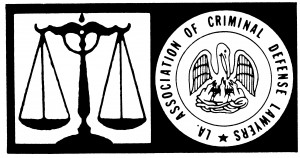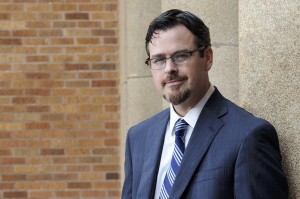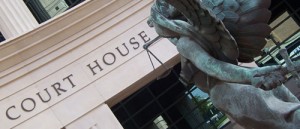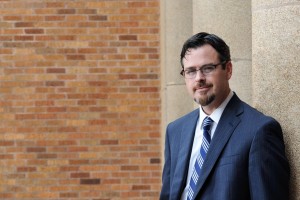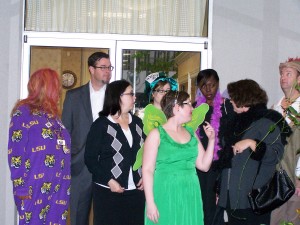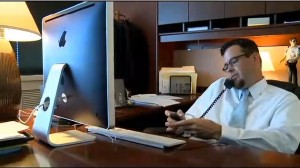News
New Law Creates Crime of “Nonconsensual Disclosure of Private Image”
One of the most important legislative updates from the 2015 session in Louisiana is the creation of La. R.S. 14:283.2, which defines and punishes “nonconsensual disclosure of a private image.”
As a result of this legislation, it is a felony for a person to “intentionally disclose an image of another person who is seventeen years of age or older, who is identifiable from the image or information displayed in connection with the image, and whose intimate parts are exposed in whole or in part.” Additionally, the person doing the disclosing has to have gotten it under circumstances under which a reasonable person would understand that the image was supposed to remain private, and that person knew or should have known that the person in the image did not consent to the disclosure of the image. Finally, the person who discloses the image must have the intent to harass or cause emotional distress to the person in the image.
Now the legislature did of course write in exceptions for criminal justice agencies, and for when the person voluntarily or knowingly exposed themselves in public, or when such images are “related to a matter of public interest, public concern,” etc.
What is the punishment for this crime? As I mentioned above, it is a felony, and it is punishable by up to two years in prison, a fine of up to $10,000 or both.
And finally, how does this affect you? Well, we now live in a world in which “sexting” is very prominent, and as a result there are more pictures floating around of people whose “intimate parts are exposed in whole or in part.” We hear plenty of stories of people who think a good way to get back at the person who broke their heart, embarrass the person who embarrassed them, or who otherwise experienced an unpleasant breakup think it would be funny to disclose pictures like this. Don’t do it! The legislature has now made the decision for us that this is NOT a good decision, and could result in very serious consequences. If you are arrested for this or contacted by a detective regarding a crime of this or a similar nature, you need to seek legal advice.
Gun Rights in Louisiana
In 2012, the citizens of the State of Louisiana amended the state constitution to provide emphatically that the right to bear arms is fundamental “and shall not be infringed,” and further subjected any restrictions placed on this right to strict scrutiny.
In 2014, the Legislature passed Act 195, which enacted La. R.S. 14:95.10 and 46:2136.3. Each of these statutes limited the rights of individuals to possess guns in particular circumstances. La. R.S. 14:95.10 restricted those convicted of Domestic Abuse Battery (La. R.S. 14:35.3) from possessing a firearm or carrying a concealed weapon. Firearm is defined in the statute as “any pistol, revolver, rifle, shotgun, machine gun, submachine gun, black powder weapon, or assault rifle which is designed to fire or is capable of firing fixed cartridge ammunition or from which a shot or projectile is discharged by an explosive.” “Weapon,” strangely, is not defined in the statute. La. R.S. 46:2136.3 involves the possession of weapons by individuals against whom protective orders have been issued.
The statute makes possession or carrying of such a firearm a felony punishable by a minimum sentence of one year and up to five years (potentially at hard labor) and a fine of not less than $500 nor more than $1,000; and criminalizes the possession of a firearm for ten years from the date of completion of sentence, probation, parole, or suspension of sentence for the underlying offense.
In July of this year, the legislature passed Act 440, which extended the reach of the Domestic Abuse Battery statute to criminalize the intentional use of force or violence committed by one household member or family member upon the person of another household member or family member. (The italicized language was added by Act 440.)
A “household member” is defined as “any person of the opposite sex presently or formerly living in the same residence with the offender as a spouse, whether married or not, or any child presently or formerly living in the same residence with the offender, or any child of the offender regardless of where the child resides.” A “family member” “means spouses, former spouses, parents, children, stepparents, stepchildren, foster parents, and foster children.”
Important to note, also, is the fact that the legislature removed a former limitation on the statute’s application. Prior to this year, if a defendant had not resided with the complainant within five years, the crime of Domestic Abuse Battery did not apply (a battery could still have been committed, but that’s a blog for another day). Now, there is no limitation on the time since the cohabitation.
Thus, despite a state constitutional amendment providing that gun ownership is a fundamental right, the Louisiana legislature has passed legislation in the intervening years broadening the circumstances under which gun ownership can be criminalized or restricted.
(It should be noted that the Federal government has had such restrictions in place for many years (see 18 USCA §922(g)(9)).)
If you or someone you know is facing charges of Domestic Abuse Battery, seek legal advice immediately so that you don’t place your fundamental rights at risk.
Louisiana Association of Criminal Defense Lawyers Calls for Decriminalization of Marijuana Use
Share
The Board of Directors of the Louisiana Association of Criminal Defense Lawyers has adopted a policy denouncing the criminalization of “responsible consumption of marijuana by adults in private.” The full text of the policy statement is as follows:
We believe that marijuana prohibition financially burdens taxpayers, encroaches upon civil liberties, engenders disrespect for the law, and disproportionately impacts students, lower income classes, African Americans, and other ethnic minorities who bear the brunt of cannabis arrests and prosecutions. The responsible consumption of marijuana by adults in private should not be defined as criminal behavior deserving of arrest, potential jail time, a criminal record, and the lifelong stigma that accompanies it. Criminalizing marijuana is a disproportionate response to what, at worst, is a health issue, not a criminal justice issue.
To view the official press release, click here.
Suit Filed Alleging Mansfield Police Officer Fabricated Evidence In Murder Case
Share
Here is the full text, and a link to the latest Shreveport Times coverage by Vicki Wellborn of the suit filed on behalf of our client Terrence Glaster, who was falsely accused of murder by a Mansfield Police officer. Mr. Glaster is represented by Senior Associate Chris Hatch.
Mansfield officer accused of fabricating evidence in murder probe
A Mansfield man twice-arrested for a homicide has filed suit in federal court, claiming the arresting officer fabricated evidence and lied during court proceeding.
Terrance Glaster states as a result of his false arrest and incarceration he’s suffered damage to his reputation, loss of income and incurred attorney fees and expenses. He’s seeking unspecified monetary compensation for the damages he said he endured with violations of his constitution, civil and statutory rights.
Attorney Christopher Hatch filed the lawsuit late Friday, naming the city of Mansfield, Mansfield Police Department, Police Chief Gary Hobbs and Sgt. Billy Locke as defendants. Hobbs and Locke are named individually and in their official capacities.
“At this time, I have not been served,” Mayor Curtis McCoy said of the lawsuit. “Through conversation, I have heard about it, but no one has served papers at City Hall so … I can’t comment on it at this time.”
Glaster, 31, has been charged on two separate occasions with the Dec. 24, 2012 shooting death of LaDerrick Hadnott, 29, of Mansfield. Hadnott was shot in the head in a house on Topeka Street he shared with a roommate.
Glaster was first arrested Jan. 25, 2013 and charged in Hadnott’s murder. The charge was dropped after a grand jury on Feb. 13, 2013 declined to indict him.
His second arrest was on March 21, 2013. Glaster was jailed until May 28, when he was released on a $200,000 bond. On Nov. 14, the DeSoto District Attorney’s office dismissed the second-degree murder charge against Glaster.
No arrest has been made in Hadnott’s murder. Hadnott’s death was the first homicide investigation for Locke. Glaster accuses the sergeant of not conducting a thorough forensic investigation nor seeking assistance from another agency with more investigative resources.
Glaster provided Locke with an alibi and the names and contact numbers for those he was with the night Hadnott was killed. Locke did not follow up on Glaster’s information, nor did he take action on information supplied by others, including a known police informant, who identified another man involved in a stabbing incident with Hadnott 23 days prior to his death, as a suspect, the lawsuit states.
The informant, identified in the lawsuit as Anthony Jackson, told Locke he was less than 10 feet from Hadnott’s house when he saw the shooter run out with a “black nine millimeter.” Jackson gave other, sometimes conflicting, statements.
“Despite the patent unreliability of Jackson’s uncorroborated statement, and despite the fact that Jackson actually implicated an entirely different person for the shooting (the man who Hadnott had stabbed), plaintiff was arrested and charged with the murder of Hadnott on January 25, 2013, based entirely on Jackson’s statement,” the lawsuit states.
Ten days after Glaster was first released from custody, a police informant reportedly contacted Locke to say he could get a confession from Glaster. In Locke’s written report he states he met with the informant, gave him a recording device, followed him to a house on Grove Street where Glaster was standing in the yard and watched Glaster get into the informant’s vehicle. Locke “loosened surveillance” and met with the informant 30 minutes later to retrieve the recording.
Defense witnesses who listened to the recording identified Makeus Washington, a felon with pending criminal charges as the informant. The two-minute recording consists of a male entering Washington’s vehicle, “briefly and spontaneously” admitting to Hadnott’s murder then exiting.
“The male who is purported to have admitted to the shooting on the recording is not Terrance Glaster,” the lawsuits states.
The “faked” recording was discussed during an in-chambers conference involving District Judge Charles Adams and an assistant district attorney. And during a bench conference about Glaster’s bond reduction, Lock also repeatedly denied identifying Washington to the defense counsel. However, a recording of the conversation between Locke and the attorney was given to the judge and district attorney.
“Sgt. Locke knowingly and maliciously misled both the assistant district attorney and the court regarding his disclosure of the identity of the informant in order to preserve the strength of his case against Glaster,” the lawsuit states.
Certified cellular telephone records obtained by defense counsel, via subpoena from Washington’s cell phone provider, show a multitude of calls between Washington and Locke during the same date and time periods referenced in Locke’s report. The same cellular telephone records reveal that there were no calls or text messages between Washington’s phone and any phone associated with or used by Glaster on the day Locke said the recording was made.
During a preliminary examination on July 17, Locke admitted he did not actually follow the informant all the way to the Grove Street house where Glaster was supposedly standing. Instead, he stopped at an intersection 1,000 feet away. Additionally, Locke admitted he only saw someone he thought “resembled” Glaster, but he did not know whether Glaster was actually the man who was standing in front of the house and got into Washington’s vehicle.
The grand jury indictment against Glaster was based on Locke’s “false testimony,” the lawsuit states. Because of Locke’s conduct, Glaster was deprived of his constitutional rights against unlawful imprisonment, false arrest and malicious prosecution, the document further states. Also noted is the potential of Glaster to have been convicted and jailed for life for a crime based on “false evidence.”
The lawsuit accuses the city, police department, Hobbs and Locke of providing inadequate resources in homicide investigations, inadequate training and supervision, inadequate training of officers in the training and use of paid informants, inadequate training of officers on their constitutional duty to testify truthfully without personal malice and failing to take disciplinary action against officers who are known to have engaged in misconduct.
Desoto Parish Man Freed after Murder Charges Dismissed
ShareHere is the full text, and a link to the latest Shreveport Times coverage by Vicki Wellborn of the dismissal of charges against our client Terrence Glaster, who was falsely accused of murder last Christmas. Mr. Glaster is represented by Senior Associate Chris Hatch.
MANSFIELD — The shooting death of a Mansfield man almost a year ago remains unsolved. And a criminal charge against an alleged shooter has been dismissed for a second time. Last month, DeSoto District Judge Robert Burgess formally dismissed an indictment handed up in March that accused Terrence Glaster, 31, of second-degree murder in the slaying Dec. 24 of LaDerrick Hadnott. Court records show no reason for the dismissal.
The indictment marked the second time Glaster had been accused of Hadnott’s death. He was arrested in January after Mansfield police developed him as a suspect. A grand jury in February declined to indict him, so he was freed.The panel convened the next month after Mansfield police generated more information about Hadnott’s death. Hadnott was discovered dead of a single gunshot to the head in a house on Topeka Street that he shared with a roommate.
Glaster’s attorney, Christopher Hatch, raised questions about the investigation and filed a pretrial motion in September seeking disclosure of grand jury testimony, particularly that of investigator Billy Locke. Hatch’s motion takes issue with information Locke provided at a previous hearing during which the detective said he saw or observed Glaster in front of a Grove Street house where a cooperating witness obtained a recording that was presented to the grand jury. “This evidence would be favorable to the defendant for impeachment purposes because it would be inconsistent with Locke’s testimony at the (preliminary examination) held on July 17, 2013, that he did not, in fact, actually see a person that he knew to be Mr. Glaster in front the Grove Street residence,” Hatch’s motion says.
Records do not indicate the court ruled on Hatch’s motion since evidence sharing in the discovery phase was ongoing just prior to the decision by the DeSoto district attorney’s office to dismiss the indictment. Mansfield Police Chief Gary Hobbs said the investigation into Hadnott’s death is ongoing.
First Annual Halloween Costume Contest!
ShareHalloween Zanniness takes over the Office!
We are a little unfocused this morning on our way to Court…
Everyone lining up for the Big First Annual Halloween Costume Contest
Hey! You can’t hide in the Back!
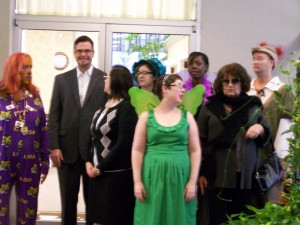
Who is that mysterious woman in the Dark Glasses?
Does she work for us?
What a Crew! that’s enough to scare any judge!
Attorney Chris Hatch Explains What To Do When You Are Stopped for Driving While Intoxicated
Share
Driving while Intoxicated is a serious criminal charge. Senior Associate Chris Hatch recently sat down with KTBS-TV New Reporter Sara Machi to discuss the advice he would give to someone stopped by a police officer and suspected of DWI/DUI. Chris explained that he recommends that anyone stopped by the police and suspected of DWI/DUI should be polite and cooperative, but should not agree to take any field sobriety test, breath test or blood alcohol test.He also discusses the penalties for DWI/DUI including community service, probation jail time and the loss of driving privileges.
Happy Constitution Day 2014!
 On this Day in 1787 thirty-nine citizens signed the document that would become the Constitution of the United States of America.
On this Day in 1787 thirty-nine citizens signed the document that would become the Constitution of the United States of America.
The Constitution is not a mere lawyers document. It s a blueprint for the erection of simple freedoms and a work-plan for the exercise of every day liberties in a free society.
Take a few moments today to think about that, and if you have some time surf on over to the National Constitution Center’s Constitution Day webpage. They have all kinds of great resources about the Constitution, its history and about how it is supposed to work.
Share
Federal Communications Commission moves to reign in profiteering of Jail and Prison Inmates by Long Distance Phone Companies
Share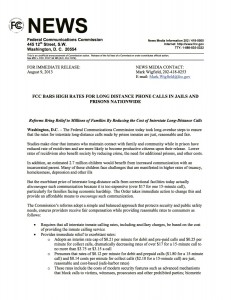 In a quiet but major development this past week the FCC brought some much needed relief for the families of inmates in America’s jails and prisons. One of the most vindictive aspects America’s war on crime has been the efforts of government agencies, including prison and jail administrators to profit from the epidemic of mass incarceration. One of the ways of doing this is to contract out the provision of telephone service for inmates to third party phone companies who charge exorbitant rates for local and long distance calls and then kickback a portion of the huge profits they take as a “commission” paid to the sheriffs and wardens of the facilities.
In a quiet but major development this past week the FCC brought some much needed relief for the families of inmates in America’s jails and prisons. One of the most vindictive aspects America’s war on crime has been the efforts of government agencies, including prison and jail administrators to profit from the epidemic of mass incarceration. One of the ways of doing this is to contract out the provision of telephone service for inmates to third party phone companies who charge exorbitant rates for local and long distance calls and then kickback a portion of the huge profits they take as a “commission” paid to the sheriffs and wardens of the facilities.
Our own Public Service Commissioner Foster Campbell has taken on the fight at the state level with limited success. See, this op-ed piece in The Advocate, and this release from the Capital News posted on Campbell’s Facebook page. Now the Federal Communications Commission has weighed in with a major action to reign in the profiteering on the back of the families of prison inmates. Here is a link to the full text of the FCC Press Release FCC Announcement DOC-322749A1 This is a major victory in the continuing efforts to restore fairness to the correction systems of America.
Freedom is a Dangerous thing
 Today is the 237th Anniversary of our Independence from the oppression of the English Crown. We would do well to remember that the freedom our Founders fought for was not freedom from foreign aggression, but freedom to enjoy the simple and most basic rights of English citizens seized by a well intended but wrongheaded government under the claim of protecting the security of its people and its colonial borders.
Today is the 237th Anniversary of our Independence from the oppression of the English Crown. We would do well to remember that the freedom our Founders fought for was not freedom from foreign aggression, but freedom to enjoy the simple and most basic rights of English citizens seized by a well intended but wrongheaded government under the claim of protecting the security of its people and its colonial borders.
On this Independence Day we need only to look to Egypt to be reminded that Freedom is never really taken by foreign armies. It is given over to domestic armies by a people too fearful to muster the courage to face the risks posed by a dangerous and uncertain future. And the future is always dangerous and risky.Keep this in mind the next time some foolish politician entices your vote with promises to make our community and country “safer” by being “tough on crime” and protecting you through expansion of the law-enforcement/prison industrial complex with more laws criminalizing more conduct and incarcerating more of our citizens.
Honor the values of Freedom that America was founded on at the ballot box. Don’t vote out of fear. Vote out of faith in the belief that all are created with equal rights and deserving of the opportunity for renewal and redemption that lead our forefathers to this land. Then our children will be able to enjoy the blessings of Freedom along with hotdogs, fireworks and watermelon on long lazy summer days like today.



